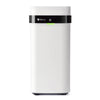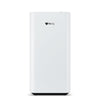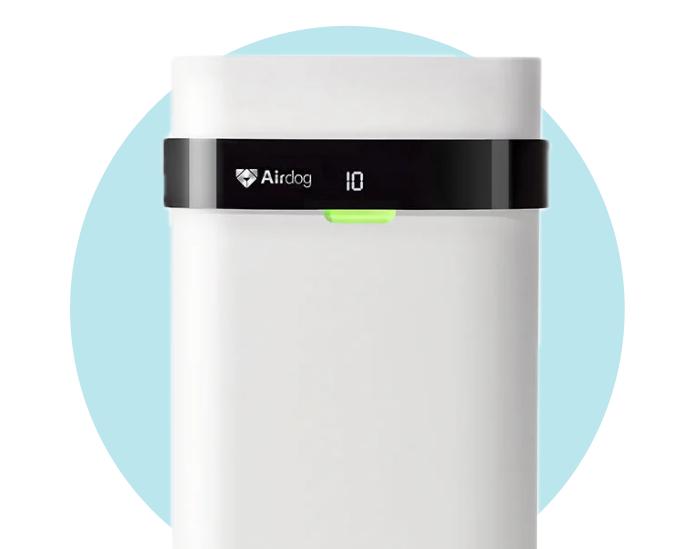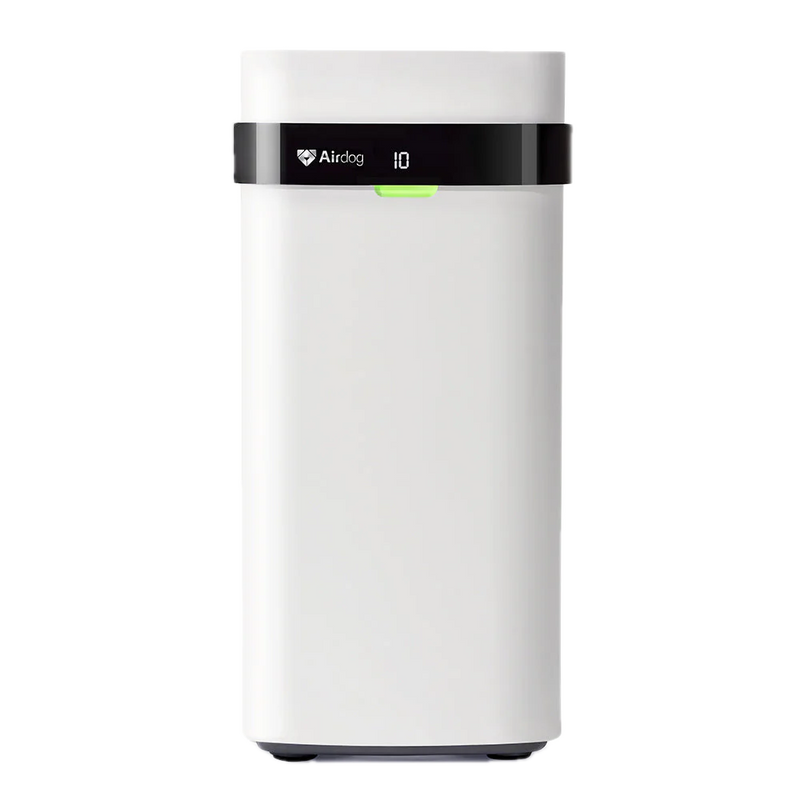Air quality can make or break how your home feels. Strong odors, stale smells, or lingering smoke not only disrupt comfort but also point to potential air pollution.
A short answer to your question: Will an air purifier help with smell? Yes.
But, not all purifiers are equal, and understanding the right technologies makes the difference between temporarily suppressing a scent and truly refreshing an indoor space.
Why Do Odors Linger Indoors?
Indoor odors persist because modern homes are designed to be airtight for energy efficiency. While that airtightness improves insulation, it also reduces circulating air and traps odor molecules inside. Microscopic particles, volatile organic compounds (VOCs), and odor-causing molecules from cooking, pets, or smoke often become embedded in fabrics and furniture. Without air purification, those persistent smells can build up and affect overall air quality.
Air Purifiers vs. Other Odor Control Methods
Many people rely on air freshening products, candles, or diffusers to mask bad smells. While they may cover unpleasant smells temporarily, they do not remove odors at their source. In contrast, air purifiers stop smells at the source by trapping molecules and harmful chemicals, resulting in fresher air and a healthier indoor environment. Proper ventilation and regular cleaning should complement air purification for maximum odor control.
Common Household Odors Addressed by Air Purifiers
Unpleasant odors at home often come from a variety of everyday sources. A quality air purifier can help by targeting both odor-causing particles and the pollutants that make smells linger. Here are some of the most common odors air purifiers can tackle:
-
Smoke Odors
-
Cigarette smoke, tobacco smoke, and fireplace smoke release microscopic particles and harmful contaminants that cling to surfaces and pollute indoor air.
-
Pet Smells
-
Pet odors and capturing pet dander are common needs for families with cats and dogs.
-
Cooking Odors
-
Frying oils, cooking smells, and strong food smells can linger long after mealtime.
-
Mold and Mildew
-
Musty odors from mold spores thrive in damp corners and basements, often signaling airborne mold spores.
-
Garbage and food waste
-
Decomposing food releases unpleasant smells that quickly spread through kitchens.
-
Chemical odors
-
Cleaning products, paints, and other VOC-heavy materials introduce harmful airborne chemicals.
-
Sweat and body odors
-
Daily living produces subtle but persistent odors that lower overall indoor air freshness.
Air purifiers help eliminate these odors by directly targeting airborne particles and odor-causing molecules at their source. The best air purifiers are also effective at capturing allergens such as dust, pollen, and pet dander, which further improves air quality.
Factors Affecting Air Purifier Effectiveness
The ability of air purifiers to remove unpleasant odors and improve indoor air quality depends on several important factors. Understanding these can help you select the right air purifier for your home and ensure you get the best results.
-
Room Size and Coverage: Air purifiers are most effective when matched to the size of your space. Using a small purifier in a large space can leave lingering odors. Always check the recommended coverage area to ensure your air purifier can handle the volume of air you need to clean.
-
Air Changes Per Hour (ACH): The frequency with which an air purifier circulates and filters the air in a room—measured as ACH—directly impacts how quickly and thoroughly odors are removed. Higher ACH rates mean the air purifier refreshes the air more often, leading to faster odor elimination.
-
Filter Quality and Type: High-quality activated carbon filters are essential for trapping odor molecules, while advanced technologies can further enhance air quality by neutralizing particles that cause smells.
-
Placement: Where you position your air purifier matters. Placing it near sources of unpleasant odors—such as kitchens, pet areas, or near entryways—allows the device to capture the particles that cause odor before they spread throughout your indoor air.
-
Maintenance: Regular cleaning and timely replacement or washing of filters are crucial for maintaining optimal air purifier performance. A neglected air purifier can become less effective at removing odors and may even contribute to poor air quality.
-
Nature and Source of Odors: Some odors, like those from smoke or strong cooking smells, may be more challenging to eliminate and require a high-efficiency air purifier with specialized filters. Identifying the main sources of bad smells in your home will help you choose the right air purifier for your needs.
By considering these factors, you can ensure your air purifier is working efficiently to reduce unwanted odors and maintain a pleasant indoor environment with cleaner, fresher air.
Choosing the Right Air Purifier for Smell Removal
Selecting the right air purifier specifically designed for odor removal ensures lasting results. Here are the factors you should consider:
-
Filter Technology Type: Activated carbon filters remain essential for odor molecules, and Airdog's TPA® technology captures harmful contaminants that HEPA cannot.
-
Room Size and ACH: Air Changes Per Hour (ACH) ensures the purifier circulates and cleans air often enough for your space.
-
Features of a High-Quality Air Purifier: Look for strong particle removal, activated carbon integration for odor absorption, and advanced odor-neutralizing systems for comprehensive air quality improvement.
-
Maintenance: Consistent performance depends on upkeep. For effective odor removal, regular cleaning and replacement of filters, or in Airdog’s case, simple washing of reusable plates, keeps performance high.
Why HEPA Air Purifiers Aren't Your Best Option For Odors
Traditional air purifiers work by pulling indoor air through a multi-stage filtration process designed to trap particles and neutralize the molecules, using technologies that specifically address odors from cooking, pets, smoke, and VOCs.
HEPA Filters
High Efficiency Particulate Air (HEPA) filters can trap particles, including dust mites, mold spores, and pet dander. While HEPA filters capture many airborne particles, they only trap, not eliminate. Over time, clogged filters can become a source of unpleasant smells and bacteria.
Activated Carbon Filters
Activated carbon filters adsorb the molecules and VOCs (volatile organic compounds) that cause odors. As air passes through the activated carbon filter, odorous molecules and gases are adsorbed, which is key to reducing unpleasant odors. Carbon filters work like a sponge, trapping gases that HEPA filters cannot capture. But standard carbon filters aren't reusable, and require frequent replacement to be effective.
Why Airdog Air Purifiers Are The Best For Odor Removal
TPA Technology
Airdog’s Two-pole Active Filtration Technology® (TPA ) generates a high-voltage electrostatic field that destroys (instead of trapping) pollutants. This includes odor-causing particles, 99.9% of bacteria and viruses, and ultrafine particles as small as 0.0146 microns (10x smaller than the influenza virus).
Washable Activated Carbon Filters
Unlike standard carbon filters, Airdog filters have a washable design, eliminating costly replacements, making it both more effective and eco-friendly, while still getting all the odor absorption benefits.
How to Maximize Odor Removal For Fresh Air
Getting the most out of your air purifier for smell removal comes down to proper placement and maintenance:
-
Strategic Placement: Position purifiers near odor sources like kitchens, pet areas, or bedrooms.
-
Combine with Ventilation: Pair air purification with proper ventilation to disperse strong odors.
-
Regular Maintenance: Maintain filters regularly. Airdog’s washable design simplifies this process while reducing waste.
With the right combination, you can enjoy cleaner air, eliminate odors, and create a more pleasant indoor environment.
Signs Your Air Purifier Is Effectively Eliminating Odors
You’ll know your purifier is working when you notice:
-
Fresher air: Lingering odors disappear, leaving rooms smelling neutral and clean.
-
Improved indoor air quality: Reduction of airborne particles, VOCs, and smoke odors.
-
Health benefits: Relief from allergy symptoms, better sleep, and fewer reactions to contaminants.
Handle Unpleasant Smells With an Airdog Air Purifier
So, will an air purifier help with smell? The answer is yes — but the right purifier makes all the difference. By targeting odor-causing particles, VOCs, and other airborne contaminants, a quality air purifier not only removes unpleasant smells but also creates a healthier, more comfortable home environment.
Airdog stands out because of its advanced TPA® technology, which goes beyond trapping pollutants to actually destroy them. Combined with washable, reusable filters, Airdog offers long-term odor control without the cost and waste of frequent filter replacements.
Discover Airdog’s high-quality air purifiers today to create healthier air in your home.
Frequently Asked Questions About Air Purifiers and Smell Removal
Will air purifiers remove odors completely?
Air purifiers stop odors by capturing molecules, volatile organic compounds (VOCs), and particles in the air . While they significantly reduce lasting smells, deeply embedded odors in fabrics or carpets may also require cleaning and ventilation.
Do HEPA filters help with smell?
HEPA filters capture particles in the air like pet dander, mold spores, and dust mites, but are not designed to remove odors. For effective removal of smells like cooking odors, you need activated carbon filters or advanced systems such as Airdog’s TPA® technology.
How does Airdog differ from HEPA air purifiers?
Airdog’s TPA® technology destroys odor-causing particles and microscopic pollutants down to 0.0146 microns, while HEPA only traps them. Airdog also uses washable, reusable plates instead of costly disposable filters, making it more effective and eco-friendly.
Do air purifiers help with pet odors?
Yes. Air purifiers help capture pet dander and reduce pet smells, leaving indoor air fresher. Systems with activated carbon or TPA® technology are the most effective for eliminating pet odors.
Do air purifiers work better than air fresheners?
Yes. Air purifiers eliminate odors at the source by trapping the molecules and contaminants that cause odors. Air fresheners only mask smells temporarily, while purifiers clean your air.





